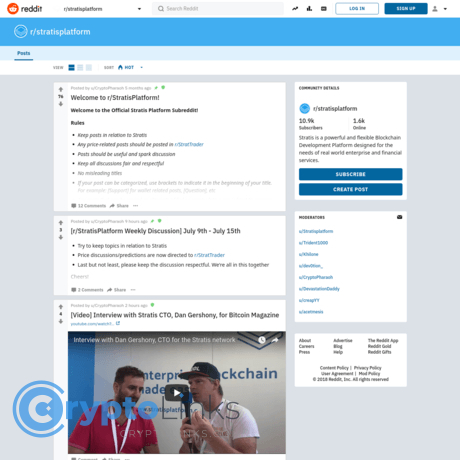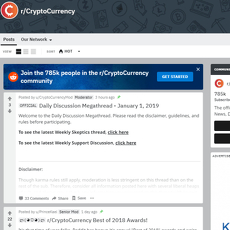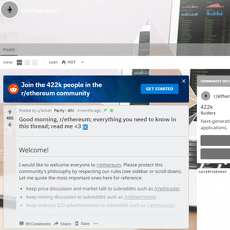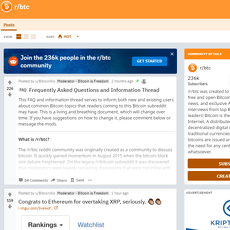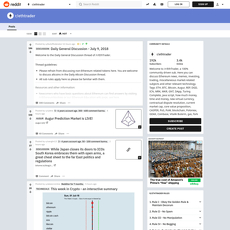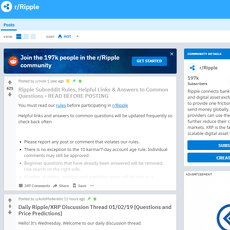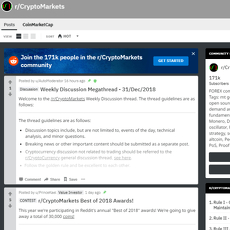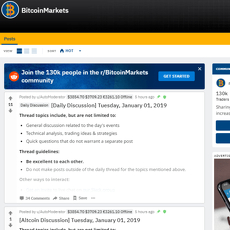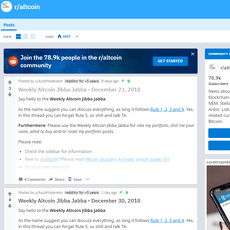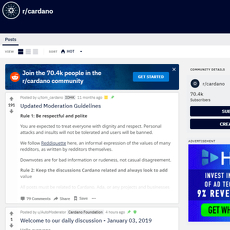r/stratisplatform Review
r/stratisplatform
www.reddit.com
r/stratisplatform (Reddit) Review Guide: Everything You Need to Know + FAQ
Ever scroll through r/stratisplatform and wonder if it’s actually worth your time—or if you’ll just end up chasing old threads and random hype?
You’re not alone. If you care about Stratis/STRAX updates, wallet fixes, staking notes, and dev progress, there’s a smarter way to use this subreddit that cuts the noise and gets you to the good stuff faster.
The problem most readers hit on r/stratisplatform
Crypto subreddits can be a mixed bag. Some are goldmines, others are ghost towns. With r/stratisplatform, the big question is simple: how do you separate signal from noise without wasting hours?
- Old posts linger and can be flat-out wrong after a major wallet or protocol update.
- Shills shout, while helpful answers get buried.
- Support threads often conflict—one comment says “reinstall,” another says “don’t,” and a third links a random GitHub fork.
- Price chatter can drown real progress: dev releases, roadmap notes, exchange status, or staking requirements.
Quick reality check: Online communities follow the “90–9–1” pattern (a known participation rule): most people lurk, a few contribute, and a tiny group posts often. That means you’ll see bursts of great info—if you know where to look and how to verify.
What you actually want (and rarely get by scrolling)
- Fresh, version-specific wallet fixes that won’t corrupt your data.
- Clear pointers to official Stratis docs, GitHub commits, and legit announcements.
- Real community sentiment—without getting dragged into endless price talk.
- Signals that the project is shipping: releases, testnets, smart contract updates, and tooling for .NET/C# builders.
What I’m going to give you instead
I’ll show you what r/stratisplatform actually offers today, how active it is, what to read first, how to search smarter, and how to spot reliable posts. If you’re chasing answers on STRAX wallets, staking, nodes, smart contracts, or exchange status, this will save you time and keep you safer.
Real examples of time-savers you can expect
- Wallet won’t sync on Windows after an update? You’ll learn how to find the most recent fix, not a 2019 post that breaks things.
- Unsure about staking requirements after a protocol change? You’ll see how to confirm with pinned posts and official docs—before moving funds.
- Looking for .NET/C# smart contract examples? You’ll spot credible dev threads and know when to cross-check GitHub.
Who this is for
- New and returning STRAX holders who want clean, current info.
- .NET/C# builders exploring Stratis smart contracts and tooling.
- Anyone checking whether the project is still shipping and where to look first for proof.
How I tested
I looked at the last 6–12 months for:
- Post cadence and comment depth (are people actually replying?).
- Moderator activity and pinned items (are pins fresh and helpful?).
- Search quality on common issues (wallet, staking, node, exchange, smart contracts).
- Link quality (official docs vs. random links; GitHub commits vs. screenshots).
Quick snapshot
- Most common threads: project updates, wallet and node help, dev links, and community news.
- Less common (and often filtered): deep trading talk and off-topic hype.
- Best value: a faster “heads-up” feed for what matters—plus practical fixes when things break.
If that sounds like what you need, you’ll want to keep going. Next up: what r/stratisplatform actually is today and why it matters—so you know exactly where it fits in your STRAX toolkit. Ready to see the smartest way to use it?
What r/stratisplatform is, and why it matters
r/stratisplatform is the subreddit where Stratis and STRAX conversations actually breathe. It works like a community noticeboard meets support desk, with a steady stream of real users comparing notes, flagging issues, and linking out to official sources. If you want a single place to catch wallet updates, smart contract talk in C#/.NET, and ecosystem news without jumping across five channels, this is it.
“Community isn’t a megaphone. It’s a feedback loop.”
What makes it useful isn’t just news—it’s the back-and-forth. A wallet release drops, someone bumps into a sync snag, another user posts a quick fix with logs and a link to GitHub, and now a dozen people avoid the same headache. That’s the loop. Research on developer behavior consistently shows people lean on peer Q&A to solve problems faster; Reddit also skews toward technically curious readers, which fits the Stratis audience well. If you’re building or holding, that combo saves time and mistakes.
Helpful signal often arrives here first—bug confirmations, workarounds, and clarifications that haven’t yet made their way into documentation.
What you’ll find inside
- Project announcements — Links to new releases, partnerships, and ecosystem news, often with context from users who’ve already tested things. Expect titles like “New STRAX wallet version available — notes + changelog” with pointers to the official site stratisplatform.com.
- Wallet and node help — Sync stalls, stuck transactions, version quirks, and OS-specific fixes. Typical thread: “Windows 11 wallet stuck at 99% — here’s the log snippet and what worked.” You’ll see replies referencing issues or PRs on GitHub.
- Developer discussions — C# smart contracts, .NET tooling, testnet notes, and sample repos. Watch for questions like “Best way to structure a C# contract for event logging?” or links to tutorials and libraries used in production.
- Ecosystem and events — AMAs, hackathons, workshop recaps, and talks. People share slides, demo repos, and recordings so you can catch up fast.
- Roadmap chatter — Threads that parse timelines, milestones, and recent commits, often with users summarizing what’s real vs. wishful thinking.
- Market mentions (secondary) — Exchange status, liquidity chatter, and listing changes. Usually filtered to keep things useful and avoid endless price spam.
For context on why communities like this work, see broad snapshots from Pew’s social media fact sheets and developer behavior captured in the Stack Overflow Developer Survey. The punchline: people ship faster when they can validate problems and solutions with peers.
Who it’s best for
- STRAX holders — Quick reads on wallet updates, exchange maintenance threads, and trusted links before you move funds.
- .NET/C# builders — Practical talk from people using familiar tools. Expect real-world code questions, package notes, and gotchas you won’t see in polished marketing.
- Curious newcomers — A reasonable “start here” view without joining every Discord and Telegram. You’ll see what’s current, what’s noisy, and where to click next.
- Quiet researchers — A fast way to gauge sentiment and momentum by reading top threads and cross-checking sources.
Posting rules, flair, and how to be seen
Good threads get faster, better answers. Use the sub like a pro and you’ll feel the difference.
- Read the sidebar and pins first — New wallet versions, known issues, and official links are often pinned. It prevents repeat questions and guesswork.
- Flair correctly — Use labels like Support, Question, Announcement, or Development so the right eyes find you.
- Write searchable titles — “Windows 11 STRAX Wallet 3.2.0 stuck at 99% sync — log snippet included” beats “Wallet help pls.” People can find and reuse the answer later.
- Add proof and sources — Link to official docs or repos when you can: Website and GitHub. It builds trust and reduces back-and-forth.
- Keep support in public — No seeds, no private keys, no DMs for “help.” Real fixes live in the thread where others can verify and learn.
If this space is a noticeboard plus support hub, the obvious next question is: how healthy is it right now? Are posts getting answers, and are the pins fresh? In the next section, I’ll check the sub’s pulse with a quick, repeatable test you can use on any crypto community—want to see if r/stratisplatform passes it today?
Activity check: is r/stratisplatform active and helpful?
I judge subreddit health the same way I judge a product’s heartbeat: consistent signals, quick response, and clear ownership. In practice, that means checking post cadence, comment depth, and how “fresh” the pinned guidance is. If those three line up, you’ve got a useful feed—not just noise.
“Activity isn’t about the loudest thread—it’s about how fast real problems get real answers.”
Signs of life to watch
Open the sub and run this 60-second scan:
- Recent threads: Posts within the last few days are a good baseline. A gap of weeks is a warning sign.
- Replies from recognizable users: Look for mod flairs or contributors who link to official docs, GitHub, or release notes.
- Pin freshness: Pinned items should reflect current wallet versions, chain updates, or migration notes. If a pin references old versions, treat advice carefully.
- Comment quality: Are replies giving steps, links, and outcomes—or just one-liners? Helpful threads read like mini-guides.
Best times and topics
From long-running notes across crypto subs, two things bring reliable responses:
- Topics that win: wallet install/sync fixes, upgrade notes, node errors, and dev roadmap/commentary—these pull in the most useful replies.
- Timing that works: Weekdays during 09:00–20:00 UTC tend to catch both Europe and US hours, which usually means better reach and faster help.
Support research consistently shows that sub-24-hour response times boost trust and satisfaction. Translate that here: if new posts still get replies within a day, the community’s paying attention.
Red flags that waste your time
- Months-old pins with instructions for outdated wallet versions.
- Thin comment threads (e.g., zero replies on obvious support questions) across multiple days.
- Unverified links in top comments, especially shortened URLs or “DM me for support.”
- Price-only chatter drowning out technical or release content—usually a sign engagement isn’t builder-focused.
How to scan fast (and not miss the good stuff)
- Step 1: Sort by Top → Past Month to catch standout updates and fixes that the community validated with upvotes and comments.
- Step 2: Switch to New and scan the latest 10–15 posts. Note time-to-first-reply and whether mods or known contributors are active.
- Step 3: Open pins and check dates, version numbers, and outbound links. Fresh pins = better signal.
- Step 4: Click through a responder’s profile on a helpful thread. If you see a history of wallet help or dev links, that’s a keeper to follow.
- Step 5: Cross-check any download link with official domains before you act.
Reply velocity: a quick health metric
Open the five newest threads and ask:
- Did someone ask a specific, solvable question? (OS + version + error message)
- Was there a reply within 24 hours? If yes across most posts, you’re in a live support loop.
- Did replies include steps and sources? A comment with a versioned fix and a link to official docs is better than ten “same” replies.
Pin freshness test
A healthy sub treats the pin bar like a living handbook:
- Version alignment: Pinned wallet/upgrade posts should match the latest public release numbers.
- Change notes: Look for “Updated on [date]” or edits from mods—these show stewardship.
- Clear routing: Pins should point to official docs, GitHub releases, or status notes so you can verify before moving funds.
Patterns of helpful threads
Threads that actually fix things tend to share the same shape:
- Specific titles: “Wallet on Windows 11 stuck at 98%—log error [XYZ]” beats “Help please.”
- Repro steps in comments: Clean install → backup path → version numbers → link to the exact patch or guide.
- Follow-up confirmation: OP returns to say “fixed” and notes what worked. That’s gold—save it.
Emotional check: why this matters
When you’re stuck on a sync or upgrade, minutes feel like hours. The right subreddit turns panic into clarity. You’re looking for a place where people don’t just talk—they show you what to do next and stick around long enough to see you through.
Want a simple, 10-minute system to spot the best answers and avoid repeat issues? Up next, I’ll show you the exact search and sort routine I use—so you get fixes fast without sifting through noise. Ready to make Reddit work for you instead of the other way around?
How to get the most out of r/stratisplatform in 10 minutes
I built a quick system that turns the sub into a fast, reliable feed instead of a time sink. If you’ve ever stared at a blank post box or scrolled past the same three wallet questions, this is for you.
“The fastest way to get help is to make it easy to help you.”
Your 10‑minute game plan
- Minute 1–2: Open the sub and hit Top → Past Month for signal. Skim headlines only. Open anything about wallet releases, node fixes, or announcements in new tabs.
- Minute 3: Switch to New. Look for fresh support threads that match your setup (Windows/macOS/Linux, hardware wallet, exchange transfers).
- Minute 4: Click into the latest pinned post. Note version numbers, dates, and any “known issues.” This reduces guesswork fast.
- Minute 5–6: Run one laser search that matches your current task. Examples below.
- Minute 7–8: If you didn’t find it, prep a question using the template here. Hit post with the right flair.
- Minute 9: Tap the Follow bell on your post and any similar threads. Save the best guide you opened.
- Minute 10: Set community notifications (details below) so updates come to you instead of you chasing them.
Search and sort that actually works
Reddit’s native search is fine, but combining it with Google’s site filter is faster and usually better. Try both:
- Reddit search shortcuts:
- Top wallet posts (year)
- New staking threads
- Use quotes for exact errors: “insufficient fee”, “not enough balance”
- Exclude noise with a minus: wallet stuck -price -moon
- Google power scans:
- site:reddit.com/r/stratisplatformwallet not syncing Windows 11
- site:reddit.com/r/stratisplatformcold staking setup macOS
- site:reddit.com/r/stratisplatformnode 1.4.* crash log
- site:reddit.com/r/stratisplatformexchange withdrawal pending
Patterns to watch:
- New shows ongoing fixes, especially right after releases.
- Top (Year) surfaces evergreen guides people come back to.
- Filter by flair if available (Support, Announcement, Question) to narrow your queue.
- Bonus speed: old.reddit.com loads faster for scanning on desktop.
Ask better questions (and get real answers)
Here’s the template I use. It cuts back-and-forth, and it works. Research on Q&A communities shows posts with specific environments, error text, and prior steps get faster, higher-quality responses (see studies like Asaduzzaman et al., 2013).
- Title: One-line problem + version + OS
Example: “STRAX wallet 1.5.2 on Windows 11: stuck at 98% sync after reboot” - Environment: OS + wallet/node version + hardware
Example: Windows 11 Pro, Stratis Core 1.5.2, SSD, behind corporate firewall - Exact error text: Quote it, no paraphrasing
Example: “Connection refused on peer 52.XX.XX.XX:16178” - What you tried: 3–5 bullet steps
Example: cleared chainstate, reindexed, restarted router, disabled VPN - What changed recently: Updates, restore, new exchange, power loss
- Screenshots/logs: If allowed, crop sensitive info; paste relevant 5–10 log lines
- Goal: State what “fixed” looks like for you
Example: “Fully synced node; safe to send/receive; cold staking enabled”
Two small tweaks that help a lot:
- Post on weekdays in UTC/Europe/US hours for faster eyes.
- Use the right flair so mods and helpers find you quickly.
Watchlist setup: updates without the noise
- Subscribe and set alerts: Click Join then the bell → choose Frequent or All so new posts ping you. On mobile, ensure Reddit notifications are allowed in your OS settings.
- Follow specific posts: Open a thread and tap Follow (bell). You’ll get notified when new comments land—perfect for release threads and support fixes you’re waiting on.
- Save smartly: Use Save on evergreen guides. I tag saved items by adding a note in my own bookmarks:
- Wallet: Setup and Recovery
- Node: Sync/Peers
- Staking: Cold/Hot
- Exchanges: Withdrawals/Deposits
If you prefer in-browser bookmarks, create a “STRAX” folder and drop the thread links there with clear titles.
- Quick re-open: Keep a permanent tab with Top (Month) and another with New.
Real-world search examples you can copy
- Wallet restore not finding funds:
site:reddit.com/r/stratisplatform restore words balance zero
Then add your wallet version and OS to tighten results. - Cold staking setup:
site:reddit.com/r/stratisplatform “cold staking” Windows
Look for threads with updated version numbers in the title. - Node peers won’t connect:
site:reddit.com/r/stratisplatform peers 0 connections firewall
Open any mod-commented answers first. - Exchange withdrawal pending:
site:reddit.com/r/stratisplatform withdrawal pending txid
Compare timestamps against network status mentions in comments.
Fast scanning cues when you open a thread
- Check the date and version numbers in the first 10 seconds.
- Sort comments by New to see if a fix landed recently.
- Skim for mod or “Team” flair replies—usually the most actionable.
- Look for reproducible steps listed as 1–2–3; save those immediately.
You can probably feel which posts “have it together” and which don’t. But how do you separate solid info from confident-sounding noise when both look similar at a glance? That’s where things get interesting—want the exact cues I use to judge credibility and stay safe without slowing down?
Quality and trust: how I spot solid info vs noise
On Reddit, one wrong link can cost you more than time—it can cost you funds. I treat every claim in r/stratisplatform like a pull request: show me sources, steps I can reproduce, and signals that someone accountable is behind it.
Credibility cues
When I’m deciding whether to trust a thread or comment, I run a quick “source stack” check:
- Official + GitHub + Mods: The strongest posts reference at least one of these:
- official site (and the pages it links to)
- official GitHub org (repos, releases, issues)
- mod-distinguished comments or pinned posts in r/stratisplatform
- Reproducible steps: Solid support replies include OS, wallet/node version, exact error text, and step-by-step fixes. If someone claims “Wallet 1.7.0 fixes sync,” I expect a link to a release note (for example: GitHub Releases), a checksum, and users confirming in the comments.
- Cross-echo: Real announcements don’t live in a single comment. You’ll usually see the same news reflected on the site, GitHub, and a pinned or highly upvoted thread. No echo = proceed cautiously.
- Link hygiene: Shorteners and random file hosts are red flags. Prefer direct links to stratisplatform.com or github.com/stratisproject. If a post uses off-domain downloads, I look for a mod confirmation or an official site page that points there.
- Author patterns: Click the user’s profile. Consistent Stratis-focused history, technical replies, and no spammy cross-posting is a good sign. Mod badges and developer usernames carry weight, but I still verify links.
“Trust, but verify.” It’s not cynicism—it’s capital preservation.
Safety basics
Crypto safety isn’t complicated; it’s consistent. A few habits will keep you out of almost every fire:
- Never share your seed phrase—not in posts, not in DMs, not with “support.” If recovery words leave your head and your hardware, assume the wallet is gone.
- Avoid unsolicited DMs. Ask for help publicly; scammers hate sunlight. If someone asks to “take it to DM,” decline and ping a mod.
- Verify downloads twice:
- Follow links from the official site or the official GitHub.
- Check file checksums on the Releases page when provided.
- Slow down “urgent” claims. Scammers lean on urgency and authority. If a fix “must be installed now” or an “airdrop ends in 15 minutes,” step back and confirm in two trusted places.
- Use test transactions before moving size. Send a small amount, confirm behavior, then proceed.
- Prefer hardware wallets where supported, or keep hot-wallet balances minimal.
- Report suspicious posts and ask mods to verify links. Community vigilance > clean-up later.
If you want a data-backed reason to stay skeptical: industry analysis continues to show that scams remain the top revenue source in crypto crime. Your best edge isn’t a new tool—it’s boundaries and process.
Outdated info filter
With Stratis specifically, old guides can look “right” while being completely wrong. Here’s how I filter:
- Check the date first. Anything pre-major updates (like the transition to STRAX) may be obsolete. If a thread says “stake STRAT” or references old wallet UIs, treat it as historical context, not instruction.
- Match version numbers. Good posts cite versions (“STRAX Wallet vX.Y.Z”). If your app’s version doesn’t match, search within the sub for newer threads or go straight to GitHub to confirm the latest release.
- Scan the newest comments. Often, someone has already corrected the OP with a recent fix or safer method. The top comment might be old; sort by “new” to see the latest corrections.
- Look for pinned consolidations. Mods usually point to current guides from a single post to reduce confusion. If a stray thread conflicts with a pinned link, the pin wins.
- Beware screenshots without context. UI moves fast. If a screenshot doesn’t show the version string or date, assume it could be from a past build.
When I’m unsure, I run a 30-second checklist:
- Does the claim appear on the official site, GitHub, or a mod-pinned post?
- Are there reproducible steps and version numbers?
- Do recent comments confirm it still works?
- Can I test it safely with a small amount or in a sandbox?
Your coins are your effort, your late nights, your wins and your regret-avoiders. Treat every link like it asks for a piece of that. If it checks out, great. If not, scroll on.
Wondering which questions the community actually answers well right now—like staking, wallets, and whether the sub is active? I’m about to unpack the most asked ones with straight, current pointers. Ready for quick clarity?
FAQ: answers to the top questions people ask about r/stratisplatform and Stratis
Is r/stratisplatform active right now?
Short answer: usually, yes—but activity ebbs and flows with releases and announcements. I treat it like a signal board. If you see posts within the last few days and at least a handful of meaningful comments on support threads, you’re in good shape. If things look quiet, sort by “Top (Month)”—important updates still bubble up even when chatter slows.
One more thing: don’t confuse low comment counts with “dead.” On Reddit, most people lurk and only a small slice contributes. The 90-9-1 rule (from Nielsen Norman Group’s research on online communities) still holds: a tiny percent creates content, a bit more comments, and the rest read. So a few high-signal threads can beat a dozen shallow ones.
What is STRAX/Stratis used for?
STRAX is the native token of the Stratis ecosystem—built around C#/.NET. Think: smart contracts in C#, sidechain-powered deployments, and enterprise-friendly tooling. Common uses include:
- Transaction fees and on-chain operations across the Stratis stack
- Smart contracts executed in C# (popular with .NET shops)
- Sidechains and interoperability (historically via components like Cirrus and InterFlux)
If you’re scouting real-world examples, look for threads where devs share GitHub repos or walkthroughs. The subreddit often points to tutorials and release notes when new tooling drops.
Can I stake STRAX, and how?
Yes, but the “how” depends on current wallet versions and any recent protocol changes. The safest path is to search the sub for “staking” + the latest wallet name, then confirm with official docs before you move a single coin.
Typical staking flow looks like this:
- Install the latest official wallet (desktop is common)
- Sync fully and ensure your funds have matured
- Unlock for staking (not sending) and keep the wallet online
- Optionally explore cold staking if supported by the current release
Pro tip: When you find a staking guide on the sub, check its date and the wallet version it references. Anything pre-major release can be wrong today.
Where can I buy STRAX?
Listings move. The sub tends to flag new exchanges or liquidity shifts, but you should always verify live markets on a reliable aggregator and compare fees, liquidity, and withdrawal status. After purchase, withdraw to a wallet you control.
- Scan recent threads for “exchange” or “listing”
- Double-check that deposits/withdrawals are enabled before you trade
- Test with a small withdrawal first—then scale
Is Stratis still building or is it dead?
Best test: look for recent commits, release notes, and announcements. The subreddit usually highlights major versions, new contracts tooling, and network updates. Sort by “Top (Year)” or “New” and scan for dev-authored posts.
Also remember: commit counts alone aren’t the whole story. Some teams ship fewer, larger changes. What you want to see is fresh, cohesive activity across repos, documentation, and community updates.
What’s the best wallet for STRAX?
The “best” wallet depends on your OS and what you’re trying to do (staking, cold storage, or just sending/receiving). The most reliable answers are usually in pinned posts or threads where mods confirm download links. Rules of thumb:
- Use official links shared in stickies or by recognized contributors
- Match the wallet version to your goal (e.g., staking vs. watch-only)
- Back up your seed phrase offline and test a small restore before going all in
Never download a wallet from a comment DM. If a fix involves a new binary, verify it in at least two trusted places—ideally a pinned post plus an official announcement.
Does Stratis support smart contracts?
Yes—smart contracts in C# have been a core Stratis theme. On the subreddit, look for threads labeled with “contracts,” “Cirrus,” or “C# examples.” You’ll find:
- Developer walkthroughs and sample repos
- Tooling updates and new templates
- Gotchas from real builders (gas, deployment steps, version pinning)
When in doubt, cross-check anything you read with official docs and the latest release notes to avoid following an outdated code path.
Support flow tip (for faster replies)
Want clean answers instead of guesswork? Use this mini-template when posting:
- Goal: what you’re trying to do (stake, restore, deploy contract)
- Environment: OS + wallet/node version + network
- Exact error/logs: copy or screenshot (hide sensitive data)
- What you tried: steps taken and results
This cuts troubleshooting time dramatically and leads to fewer “it depends” replies. It also helps future readers who find your thread via search.
Want a straight yes/no on whether you should actually join the subreddit and how to use it without wasting time? Keep going—next up, I’ll share a quick routine that filters 90% of the noise and keeps you on top of the only updates that matter.
My verdict: should you join r/stratisplatform?
Yes. If you want a clean, community-filtered feed of Stratis/STRAX updates without Telegram chaos, r/stratisplatform is worth your time. It shines when you want quick signals on new releases, wallet quirks, ecosystem news, and real-world feedback from people who’ve actually run the commands or tested the builds. You’ll still need to sanity-check links and dates, but as a weekly checkpoint, it’s strong.
Here’s why I’m confident: healthy subreddits amplify useful work and downrank noise. That aligns with well-known community research—Kraut and Resnick’s “Building Successful Online Communities” showed that visible norms and active moderation tend to lift information quality, while Nielsen’s participation inequality (the 90-9-1 rule) explains why a small set of recurring contributors are often your best signal. In practice, that means a few familiar usernames, clear rules, and updated pins can tell you a lot about what to trust and where to look first.
Who will get the most value
- Newcomers who want a quick pulse without juggling five different channels. You’ll spot the latest headlines, upgrade notes, and trustworthy wallet tips.
- Holders who track cadence. You’ll catch milestone threads, roadmap chatter, and community reactions that help you judge momentum.
- .NET/C# builders who want context around tooling changes and gotchas. It’s useful for finding “this broke on Windows/macOS; here’s the workaround” posts and links to repos.
Example scenarios where it helps right away:
- Wallet hiccups: Posts that say “stuck on headers” or “no peers” usually get OS-specific fixes and version notes. Users often share exact steps that worked for them.
- Release day questions: Upgrade threads tend to attract quick clarifications—what’s required, what’s optional, and which components to update in what order.
- Builder breadcrumbs: If you’re testing smart-contract tooling or frameworks in .NET, you’ll often find community pointers to sample repos and recent changes, plus what to watch before pushing anything to production.
Simple routine
You don’t need to camp on Reddit to get value. Ten minutes a week is enough.
- Once a week: Sort the sub by Top (Month) to catch the most useful discussions and announcements, then skim New for fresh issues.
- Save the good stuff: Hit “Save” on evergreen guides and troubleshooting threads so you can reference them later without re-searching.
- Verify anything touching funds: If a thread suggests moving coins, reinstalling, or downloading new binaries, cross-check with official channels—GitHub and the project’s main site—before you act.
- Stick to weekday UTC/US/EU hours: If you need help, posting during peak community times usually yields faster, better answers.
Rule of thumb: treat Reddit as a signal booster, not a single source of truth. Great for discovery; final decisions go through official docs and releases.
Why this method works: batching your checks trims noise and reduces knee-jerk decisions—something we’ve all regretted in crypto. Research on participation inequality from Nielsen Norman Group backs this up: a minority of consistent contributors drive most of the high-quality content, so a weekly pass over top posts captures the essentials without the time sink.
Conclusion
Short answer: subscribe. Use r/stratisplatform as your fast filter for what matters in Stratis—news highlights, wallet help, and builder context—while you confirm anything sensitive through official sources. Ask precise questions, include versions and OS details, and ignore random DMs. Do that, and you’ll get the upside of Reddit’s collective know‑how without the headaches.
Helpful links to keep handy: r/stratisplatform, Stratis GitHub, and a classic resource on community quality: Nielsen’s 90-9-1 rule, plus the MIT Press book Building Successful Online Communities.

